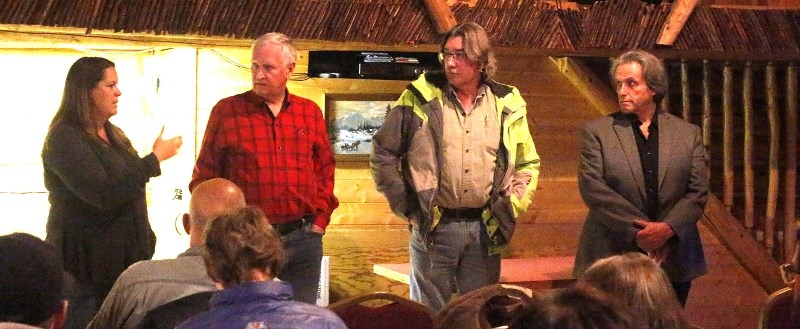A second community meeting held at Dartique Hall by the ‘Concerned Citizens of Bottrel/Water Valley’ group wound up in a heated debate with many area residents feeling more uncertain than ever about the potential for an industrial gravel pit operation in their rural community.
Over 70 community members, area business owners and recreators gathered to express their concerns during the evening of March 11, followed by a ‘Q and A’ session with one of the owners of Standing Stone Gravel Ltd. (the gravel pit applicant), Doug Bychyk, and the company’s engineering consultant, Robert Kelham.
The question and answer period, however, fell short of satisfying those in attendance.
“It certainly riled some people and I think the community is more concerned than ever,” said one of the group organizers, Dana Strasser, who runs a small natural beef production with her husband, Andy, and two children in Bottrel.
Bychyk and Kelham failed to respond to the vast majority of questions they were hammered with.
Bychyk even apologized to the room for being so ill prepared for the community meeting, repeating that he ‘did not expect so many people to show up’ and he would be in touch with his consultants for clarification.
The questions ranged from the applicant’s vague estimations of anywhere from ‘plus or minus 10-20 loaded gravel trucks’ travelling along roads not built anywhere close to a standard that could withstand such weight, to the absence of baseline environmental assessments, to the potential impacts on noise health, safety and environmental (animal, plant and watershed life) concerns and congestion on an already busy Hwy 22.
Bychyk did say that Standing Stone would commit to noise and hydrology studies to establish baseline assessments.
Andy Strasser and Camp URSA owner/operator Thomas Thomas have pointed out that Standing Stone’s letter to their investors, which states that there is 10 million tons of gravel to be extracted over a 15-year period, results in basic math that far exceeds 20 loaded gravel trucks daily. Strasser and Thomas pointed out that a loaded gravel truck with 20,000 pounds per load (capacity) at 20 loads per day would appear to result in far less than the anticipated 10 million tons in that span (based on the application for six days a week from 7 a.m. – 7 p.m. for half the year and for 24/7 operations up to six months of the year).
Kelham denied that the gravel demands in Calgary would see an excess of 20 trucks a day, although Strasser and Thomas’ basic calculations resulted in more like 70-100 loaded gravel trucks daily.
Three Rocky View County (RVC) councillors, Bruce Kendall (Div. 9), Al Sacuta (Div. 8) and Jerry Arshinoff (Div. 2) were present to field questions over county process, as was Mountain View County Div. 2 Coun. Patricia McKean.
Kendall explained that this matter was a little ways from a public hearing with the county and that RVC would likely first be establishing a thorough bylaw before approving any gravel extraction applications in Div. 9.
“Right now, the county is preparing a report on best practices in dealing with aggregate extraction. This report should go forward in April, but the specific date has not been set yet,” explained Grant Kaiser, manager of communications for the county.
“The best practice report will give RVC council the information it needs to make a decision on future decisions. If council wishes to pursue a new bylaw, the next steps would be public engagement on the issue, followed by reports and the actual bylaw — this process would likely take us into 2016 before everything is finalized.”
Arshinoff said the most important thing concerned community members could do is to stay engaged and to attend a public hearing.
“Make sure you show up to the public hearing, no matter what side you’re on — that is by far the biggest effect you can have.”
McKean said that “Mountain View County has no comment on the application for the gravel pit…our concern is the roads.”
She added that Twp. Roads 290 and 292 (both which run through Mountain View County) are currently not built to a standard that could withstand increased industrial traffic; the applicant would likely have to look to RVC to route their gravel haul traffic.
The evening wrapped up with the Standing Stone representatives attempting to quell concerns that the application was ever ‘set in stone’ and that ‘everything was up for negotiation.’
Bychyk said that their letter to investors was out of date and that their application (submitted to the RVC in Dec. 2014) was only a ‘starting point’.
Fenton Bus Lines owner/operator, Kathy Fenton, expressed tremendous concern over the safety of children along her bus route — should there be an increase in industrial traffic along her route throughout Bottrel.
Area business owners, including the area Scouts camp, Camp URSA, the Bottrel General Store and agricultural operators expressed similar sentiments that an industrial-scale operation would have irreparable consequences for their businesses and livelihoods.
To learn more about the ‘Concerned Citizens of Bottrel/Water Valley’ group, email [email protected] or call 403-993-4841.
Kendall said concerned parties should write letters of concern to RVC; the letters should be addressed to Stefan Kunz, who can be reached at [email protected] or at 403-520-3936.




